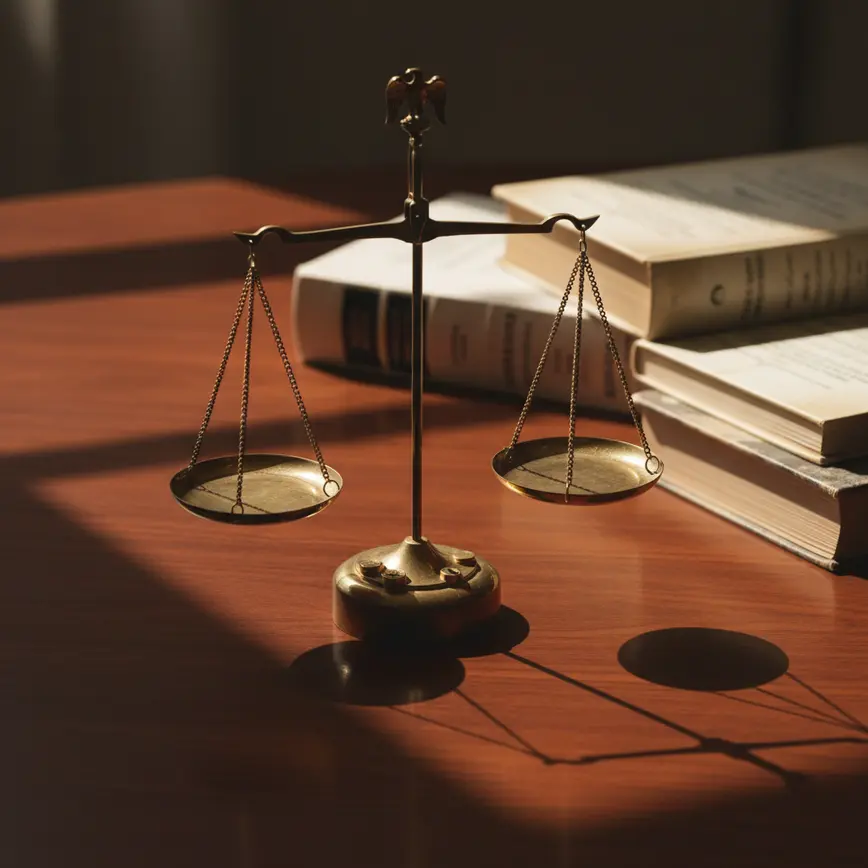
🔑 Key Takeaway
Judicial independence is the principle that courts and judges must be free from external pressure to ensure fair, impartial decisions based on law and fact.
• It is a cornerstone of democracy, ensuring everyone is subject to the law. • It protects human rights by preventing unlawful government actions. • It provides a critical check on the legislative and executive branches of government.
Read on for a complete analysis of this principle through the case study of Pakistan’s 27th Amendment.
The principle of judicial independence asserts that judges must be free from external pressure to ensure fair trials and uphold the rule of law. While the concept may seem abstract, it serves as a critical safeguard for democracy and individual rights across the globe. This article will define this fundamental principle and analyze it through the important, real-world case study of Pakistan’s 27th Constitutional Amendment, exploring how legal frameworks can either protect or challenge this core tenet of governance.
The 27th Amendment is a recent and significant legislative event that brings the theoretical concept of judicial freedom into sharp focus. By examining its provisions and the debates surrounding it, we can better understand the delicate balance required to maintain a just legal system. This article will explore the amendment’s key changes, the potential threats it poses to judicial autonomy, and why this specific case matters for broader global democratic principles. To understand the amendment’s potential impact, we must first look at its specific provisions.
ℹ️ Transparency
This article explores the concept of judicial independence using Pakistan’s 27th Amendment as a case study, based on legal principles and expert analysis. Our goal is to inform you accurately and transparently.
What Is the 27th Constitutional Amendment in Pakistan?
The 27th Constitutional Amendment in Pakistan is a proposed legislative change primarily designed to alter the process of judicial appointments and redefine the jurisdiction of the Supreme Court of Pakistan. Such amendments, which modify the country’s foundational legal document, the Pakistan Constitution, often generate significant debate. In an analysis of a similar amendment, legal scholars on Verfassungsblog noted that such changes can sometimes be passed with procedural irregularities, such as being enacted rapidly with little to no public consultation, which may conflict with core principles of parliamentary democracy. The amendment introduces several key changes to the existing legal framework.
Key Provisions of the Amendment
The main changes introduced by the amendment reportedly include:
- Altered judicial appointment process: This could change who has the authority to select and confirm judges for higher courts.
- New limits on Supreme Court authority: The amendment may place new restrictions on the types of cases the Supreme Court can hear or the scope of its rulings.
- Introduction of new criteria for judicial review: It could establish different standards for how the judiciary reviews laws passed by the legislature.
The Stated Goals vs. Criticisms
The government’s stated rationale for the amendment often centers on goals like increasing judicial accountability and streamlining court processes to improve efficiency. However, these justifications are frequently contrasted with sharp criticisms from legal experts and international bodies. For instance, in a statement on a similar legislative action, the International Commission of Jurists (ICJ) raised concerns that such changes could compromise judicial independence by transferring judge selection authority to political actors and allowing for the removal of judges based on vague criteria.
Why Judicial Independence Is a Cornerstone of Democracy
Judicial independence is widely considered essential for a functioning democracy because it helps ensure that justice is administered impartially, based on facts and law rather than on political or popular pressure. According to the UN Office on Drugs and Crime (UNODC), this principle is a “cornerstone” of the rule of law. Without it, powerful entities could potentially influence court decisions, which could lead to an erosion of rights and a drift away from democratic principles. The United Nations’ own basic principles on the matter state that the judiciary must decide matters “without any outside influences whatsoever.”
Ensuring Fair Trials and Equal Justice
Judicial autonomy allows judges to decide cases based purely on the evidence presented and the applicable laws, not on the political influence or financial status of the parties involved. This is crucial for ensuring that every individual receives a fair hearing. For example, if a private citizen were to sue a powerful government agency, an independent judiciary would be necessary to ensure the case is decided on its merits. This principle is a key component in maintaining public trust in the legal system.
Upholding the Rule of Law
The rule of law is the principle that everyone—from individual citizens to the government itself—is accountable under the law. An independent judiciary is often seen as the primary enforcer of this principle, as it has the authority to ensure that laws are applied equally to all. This concept is not just a theoretical ideal; it has practical consequences. In a long-term global analysis, the World Bank found that higher scores in the rule of law are consistently associated with better economic and social development outcomes.
A Critical Check on Power: The Separation of Powers
The concept of separation of powers divides government into three branches: the executive, the legislative, and the judicial. Each branch has its own distinct responsibilities and powers, and they are designed to act as a check on one another. The judiciary’s role in this structure is to interpret the law and, when necessary, to prevent the other two branches from exceeding their constitutional authority. This function helps protect constitutional limits and prevent the concentration of power, which is a key safeguard for individual liberties.
Direct Threats to Judicial Independence from the 27th Amendment
The 27th Amendment is viewed by some critics as posing specific threats to judicial independence by potentially shifting power over judicial matters from the judiciary to the executive and legislative branches. This dynamic, where political forces can impact judicial autonomy, is a subject of ongoing study. For example, a cross-country analysis of 97 democratic nations published by Cambridge University Press found that in developing democracies, high levels of political competition can significantly hamper the independence of the courts.
Centralizing Power and Reducing Autonomy
One of the primary concerns raised by legal experts is that the amendment’s proposed changes to the judicial appointment process could give political bodies more control over who becomes a judge. When appointments are heavily influenced by political considerations, there is a risk that judges may be selected based on their perceived political loyalty rather than their legal merit or impartiality. This shift can create an environment where judges may feel subtle or direct pressure to rule in ways that align with the preferences of the government that appointed them, potentially compromising their autonomy.
The Debate: Judicial Accountability vs. Control
A key concept in this debate is judicial accountability, which is the idea that judges, like other public officials, should be answerable for their conduct and decisions. Proponents of the amendment may argue that its provisions are necessary to ensure judges remain accountable to the public and the constitution. However, critics argue that the amendment may cross a critical line from ensuring accountability to exerting political control. A 2009 analysis in the Cleveland State Law Review notes that while a tension between independence and accountability often exists, the ultimate goal of both concepts should be “fair, impartial, and effective justice.”
FAQ: Understanding Judicial Independence
What is judicial independence in simple terms?
In simple terms, judicial independence means that judges can make legal decisions without fear of being fired, punished, or influenced by politicians, powerful people, or public opinion. It helps ensure that court rulings are based only on the facts of the case and the relevant laws, which can contribute to a fair and unbiased justice system for everyone.
Why is judicial independence important?
Judicial independence is important because it protects the rule of law and helps ensure fair trials. It allows judges to hold the government accountable, safeguard human rights, and resolve disputes impartially. Without it, the powerful could potentially ignore the law, and citizens might have no neutral authority to protect their rights, which could undermine the foundation of a democratic society.
What violates judicial independence?
Actions that may violate judicial independence include governments threatening or firing judges for unpopular decisions, changing laws to control judicial appointments, reducing court funding to exert pressure, or public officials publicly condemning judges for their rulings. Any external pressure—whether from politicians, corporations, or public opinion—that attempts to influence a case’s outcome may undermine this core principle.
How does a constitution guarantee judicial independence?
A constitution typically helps guarantee judicial independence through several key mechanisms. As noted in a 2022 analysis in the Harvard Law Review, these often include granting judges security of tenure (protecting them from arbitrary removal), ensuring their salaries cannot be reduced, and establishing a clear, merit-based process for their appointment. These provisions are designed to insulate the judiciary from the political pressures of other government branches.
What are two ways the constitution helps ensure judicial independence?
Two primary ways a constitution helps ensure judicial independence are by providing for lifetime appointments or long, fixed terms and by protecting judicial salaries. Lifetime appointments or long terms can free judges from the fear of political reprisal for their decisions. Similarly, protecting their salaries from being reduced by the legislature helps prevent financial pressure from being used as a tool to influence their rulings.
Limitations, Alternatives, and Professional Guidance
Research Limitations
It is important to acknowledge that the full impact of any constitutional amendment can take years to become clear. The real-world outcomes are often complex and influenced by many political, social, and economic factors beyond the legal text itself. Furthermore, scholarly views on the ideal balance between judicial accountability and independence can differ, and this analysis is based on established legal principles and expert commentary available at the time of writing.
Alternative Approaches
There are various models for judicial appointments and oversight that aim to balance independence with accountability. Some countries use non-partisan commissions composed of legal experts, judges, and lay members to screen and recommend judicial candidates. Others employ a multi-branch approval process requiring confirmation from different parts of the government. No single system is universally seen as perfect, and different countries often adopt approaches that reflect their unique legal traditions and political histories.
Professional Consultation
Understanding specific legal challenges and constitutional law in any country requires careful and detailed study. For a deeper understanding of the issues discussed, readers are encouraged to engage with scholarly articles, reports from human rights organizations, and official legal documents. For specific legal advice or interpretation, it is always recommended to consult with qualified legal professionals who are licensed to practice in the relevant jurisdiction.
Conclusion
In summary, judicial independence remains a vital, yet often fragile, component of a democratic society. The debate surrounding the 27th Amendment in Pakistan serves as a critical and contemporary case study of how this fundamental principle can be challenged by legislative changes. The core insight from this analysis is that efforts to protect the judiciary’s autonomy from undue political influence are often essential for upholding the rule of law and safeguarding the rights of all citizens.
The Tech ABC is committed to providing accessible and clear analysis on complex global issues that intersect with technology, law, and society. As these conversations evolve, staying informed is one of the most powerful tools available to global citizens. We encourage our readers to continue exploring these important topics to better understand the forces shaping our world. Read more of our analyses on global affairs and technology’s impact on society.
References
- UN Basic Principles on the Independence of the Judiciary: https://peacemaker.un.org/sites/default/files/document/files/2022/07/intlstdsindepjudiciary_0.pdf
- World Bank – Worldwide Governance Indicators: https://www.worldbank.org/en/publication/worldwide-governance-indicators
- Cambridge University Press – Law and Society Review: https://www.cambridge.org/core/journals/law-and-society-review/article/abs/judicial-independence-across-democratic-regimes-understanding-the-varying-impact-of-political-competition/C5DB7877EECC0A312650D0082D8D3D2C
- Cleveland State Law Review: https://engagedscholarship.csuohio.edu/cgi/viewcontent.cgi?article=1097&context=clevstlrev
- International Commission of Jurists (ICJ): https://www.icj.org/pakistan-26th-constitutional-amendment-is-a-blow-to-the-independence-of-the-judiciary/
- Verfassungsblog: https://verfassungsblog.de/pakistans-26-constitutional-amendment/
- Harvard Law Review: https://harvardlawreview.org/print/vol-135/is-a-science-of-comparative-constitutionalism-possible/
- UN Office on Drugs and Crime (UNODC): https://www.unodc.org/e4j/en/crime-prevention-criminal-justice/module-14/key-issues/1–general-issues–judicial-independence-as-a-fundamental-value-of-the-rule-of-law-and-of-constitutionalism.html




